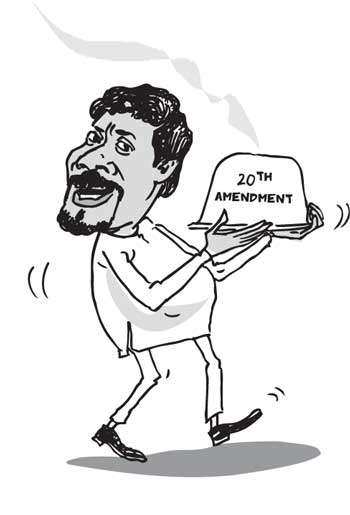JVP’s 20th Amendment; a test for major parties

2018-05-26
In significant move, the Janatha Vimukthi Peramuna (JVP) leader Anura Kumara Dissanayaka, in parliament yesterday handed over a private members bill or the 20th Amendment calling for the complete abolition of the 40 year executive presidential system. This system has been widely criticised by almost all parties but no one really got down to abolishing it due to many wide ranging reasons.
In July 1977, when the United National Party’s (UNP’s) then leader J.R Jayewardene won an unprecedented 5/6 majority in parliament, it possibly may have given him ideas of exercising absolute power and keeping his party in power for decades unlike the long drawn Constitutional Assemblies which we see even now Mr. Jayewardene - obviously with the help of his eminent lawyer- brother H. W Jayewardene, worked out an executive presidential system within eight months. On February 04, 1978 he was sworn in as Sri Lanka’s first Executive President with virtually unlimited political powers and without the checks and balances we see in other countries. In Sri Lanka the Executive Presidential system had its positives as well negatives.
Many see the necessity of a strong executive arm to carry out large scale development measures as undertaken during the terms of Presidents J.R. Jayewardene, Ranasinghe Premadasa and Mahinda Rajapaksa. They argue that such decisive implementation of development projects would not have been possible if not for the Executive Presidency. The same is seen with regard to the ending of the war. Among the widely seen political abuses from 1978 to 1988 was the 1982 Referendum which, most analysts believed was legal but illegitimate though Mr Jayewardene won a 50.1 majority in the controversial Referendum it was twisted and turned into a 5/6th majority in parliament.
Many analysts believe, this move drove the JVP out of main stream politics into which Mr Jayewardene himself had brought the party after the former Sirimavo Bandaranaike government appointed a wide - powered Criminal Justice Commission (CJC) which sent most JVP leaders to jail. The move also is believed to have been one of the main causes of July 1993 racial riots which was one of the biggest black marks in Sri Lanka’s history and regard the devastating 26 – year ethnic war. Mr Jayewardene also virtually got rid of the opposition with a Special Presidential Commission (SPC) stripping former Premier Sirimavo Bandaranaike and other leaders of their civic rights and introducing the Fifth Amendment which forced the then Opposition Leader Appahpillay and Amirthalingam other Tamil members to quit parliament.
The next President Ranasinghe Premadasa also manipulated the executive system especially by the manner in which he dealt with the impeachment motion introduced by UNP seniors Gamini Dissanayaka, Lalith Athulathmudali and others. In 1994, when Chandrika Bandaranaike Kumaratunga took over as SLFP leader, she promised the JVP, she would abolish the executive presidential system within 24 hours if she was elected president because she believed it was the biggest curse for the country. But she did not follow through with her promises. After Mrs Kumaratunga, President Rajapaksa also promised to abolish the executive presidency but in 2010 he did just the opposite by enforcing the 18th Amendment which gave him the power to be president for life with absolute authority. In the campaign for the January 2015 presidential election, Maithripala Sirisena also promised to abolish it but had not fulfilled it so far.
The JVP ceremonially handed over the motion at 11.15 a.m yesterday, to Parliament Secretary General Dhammika Dasanayake in the presence of the Speaker Karu Jayasuriya. JVP frontliner MPs Suinil Handunnetti and Nihal Galappaththi were also present. It says the 14 page Bill may be sited as the 20th Amendment to the Constitution and essentially wants a ceremonial president elected by parliament on the advice of the Cabinet of Ministers.
However, detractors point out that at the time the Executive Presidency was introduced the 13th Amendment was not there and abolishing it at that time would not have been a concern. They point out that with the enactment of the 13th Amendment certain safeguards against secession are hinged on the Executive Presidency and therefore it is not advisable to abolish it while the 13th Amendment remains in place as it is. We hope all parties would consider what is best for the country and decide on this important issue in a balanced way.

